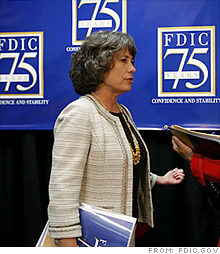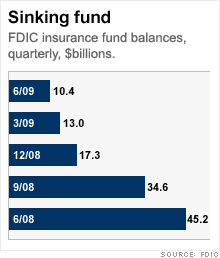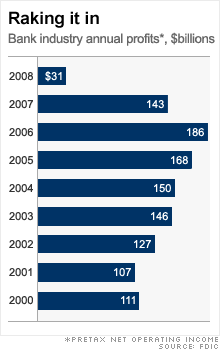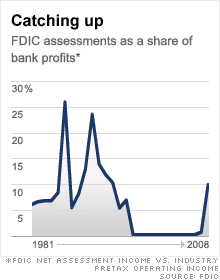FDIC asks banks for help
The agency raised its estimated bank failure tab and wants banks to kick in $45 billion to shore up the deposit insurance fund.
 |
| Sheila Bair wants to spread out the assessment burden on banks. |



NEW YORK (Fortune) -- The banking bust is getting mighty costly.
Bank regulators on Tuesday sharply raised their estimate of the cost of cleaning up after bank failures -- and proposed sending the industry a $45 billion tab to shore up the dwindling deposit insurance fund.
The staff of the Federal Deposit Insurance Corp. said it expects expenses tied to failed banks to surge to $100 billion over five years -- up 43% from the agency's last estimate in May.
As a result of the rising costs and the pressures on the agency's cash position, the FDIC proposed that banks prepay their deposit insurance premiums for the next three years at the end of December.
The move would head off a cash crunch at the fund that stands behind consumers' bank deposits. Under FDIC guidelines, bankers and others will have a month to comment on the proposal before it becomes a rule.
The FDIC said the fund, under strain from 95 bank failures this year, will have a negative balance when the third quarter ends Wednesday and could run out of cash by the end of the first quarter next year. Over the past year, the deposit insurance fund balance has dropped to $10 billion from $45 billion.
As a result, there is a need for banks to pony up cash on hand now to support the fund, which supports more than $4 trillion in insured deposits.
The FDIC said the banks mostly will be able to make the payments out of reserves, so it won't unduly strain their finances or reduce lending.
"Our analysis suggests the industry can step up, so that's what we are asking them to do," said FDIC chief Sheila Bair.
The agency said the banking industry has "substantial liquidity," with some $1.3 trillion in liquid balances -- up 22% from a year ago.
Because the banks won't have to account for their payments to the FDIC all at once, the plan proposed Tuesday "will put the industry's liquid balances to good use in conserving capital and helping to maintain the capacity of banks to lend while they rebuild" the fund, the FDIC said.
The industry, which had been lobbying against another option open to the FDIC -- levying a so-called special assessment on banks, as it did earlier this year -- generally praised the prepayment decision.
"At this critical time, when the economy is just beginning its recovery, looking to options that are less pro-cyclical and that spread the cost over time is the right policy," the American Bankers Association said in a statement.
The FDIC said it wouldn't make any further special assessments on banks for the rest of the year, and ruled out raising the premiums it levies on banks till 2011.
Tuesday's proposal highlights how much money the banks have made over the past decade, while until recently contributing little to the insurance fund.
In the seven years leading up to the bloodbath of 2008, when banking industry profits tumbled 78% as the credit bubble collapsed, FDIC-insured commercial banks made an average pretax operating profit of $142 billion, according to agency data.
Over the same period, the industry paid out just $170 million a year, on average, in deposit insurance premiums, thanks largely to a 1996 law backed by the bankers' friends in Congress. In 2006, President Bush signed into law a measure that restored the FDIC's right to assess premiums on well-capitalized banks.
Since the markets melted down two summers ago, the FDIC has been playing catch-up. It booked $643 million in net assessments in 2007 and $3 billion last year -- and is on track to bring in some $17 billion over the course of 2009.
The FDIC does have some other options to shore up the fund. For instance, it could borrow cash from the Treasury Department.
The agency has a $100 billion standing credit line with Treasury -- and, thanks to a law passed this year, the authority to borrow as much as $500 billion through 2010 in an emergency.
But Bair has been reluctant to tap into this line of credit. She and other officials said Tuesday they prefer to leave the Treasury credit line untapped unless there is what they call an emergency situation -- such as the failure of a massive institution.
"I think that the American people would prefer to see an end to policies that look to the federal balance sheet as a remedy to every problem," Bair said. "That is especially the case with an industry that has the resources to deal with the problem." ![]()
-
 The retail giant tops the Fortune 500 for the second year in a row. Who else made the list? More
The retail giant tops the Fortune 500 for the second year in a row. Who else made the list? More -
 This group of companies is all about social networking to connect with their customers. More
This group of companies is all about social networking to connect with their customers. More -
 The fight over the cholesterol medication is keeping a generic version from hitting the market. More
The fight over the cholesterol medication is keeping a generic version from hitting the market. More -
 Bin Laden may be dead, but the terrorist group he led doesn't need his money. More
Bin Laden may be dead, but the terrorist group he led doesn't need his money. More -
 U.S. real estate might be a mess, but in other parts of the world, home prices are jumping. More
U.S. real estate might be a mess, but in other parts of the world, home prices are jumping. More -
 Libya's output is a fraction of global production, but it's crucial to the nation's economy. More
Libya's output is a fraction of global production, but it's crucial to the nation's economy. More -
 Once rates start to rise, things could get ugly fast for our neighbors to the north. More
Once rates start to rise, things could get ugly fast for our neighbors to the north. More







